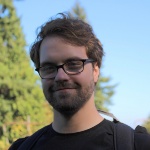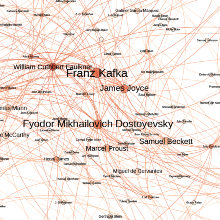Diversity at the thematic and methodological level
The projects of the Digital Humanities department cover a wide range of topics: From editing to stylometric, narratological, linguistic and social science issues.
Such a diversity of domains and data also requires a variety of approaches. Therefore, projects of both the employees as well as those of student groups from the project seminars are characterized by very different methods. Text statistical methods for style and topic analysis are used as well as database modeling and simulation.
Projects
Staff: Gabriel Viehhauser
The project deals with the digital modelling of spatial constructions in narrative texts. The category of space has so far received little attention in narratology, although the location of a narrative is a central element similar to the characters or the plot. In Yuri Lotman's approach to spatial semantics, it becomes especially clear that spaces often have a meaning of their own, e.g. the forest is often the sphere of monsters and fairies and stands in contrast to the city, castle or civilisation. The border between these spaces can usually only be crossed by the hero; so it becomes clear how in Lotman's approach figures, event and plot belong together.
On the one hand, digital modeling of this semantics of space presents a methodical challenge, since spaces in narratives are, to a large extent, also implicitly created and are difficult for the computer to grasp. On the other, it is precisely the need to specify the models that the computer requires which can bring a narratological gain in knowledge. We are currently concentrating on network analyses of various texts, but, above all, on Ovid's Metamorphoses in order to visualise the network relationship between the entities of space, figures and events.
Staff: Malte Heckelen
In my PhD thesis, I show how Marvel and DC build their transmedial storyworlds. To do this, I merged data of the Marvel and DC Fandom wikis as well as comics.org (ranging from the 1960s to 2018; data on comics, movies, tv series and others). The resulting dataset allows me to describe and model the evolution of character networks (based on co-occurence in stories) as well as the network of professional collaborations.
I am especially interested in notions of narrative momentum. Transmedial stories, and serial content in general, lives on, expands and stays interesting for consumers through the narratives implied by the world already established: if Superman and Batman are together in a team, this generates fan questions, and therefore potential stories. For instance on how such unequal characters manage to make decisions - or simply on who has coffee duty in the JLA Watchtower.
To research how this kind of worldbuilding is achieved (perhaps differently) for Marvel and DCs heavily interconnected and long-lived storyworlds, I look at how characters move towards one another in the dynamic co-occurence network - how their storyworlds overlap more or less over time and thus imply new connections.
Which characters and their storyworlds have more momentum over time and how much and when does the overall narrative universe concentrate on these characters? Does this differ for some of their traits (e.g. gender)? And does this produce unwanted incongruities that influence brand recognition negatively (storyworlds differing heavily between, e.g., movies and comics)?
As the creative process in U.S.-American comics is heavily collaborative, I am also interested in the social connections established through previous collaborations. Is professional closeness between creatives a predictor of character choice? Or are classic network dynamics like preferential attachment or triadic closure better at predicting future relations between characters?
Contact Us
Kerstin Dorner
Secretary

Malte Heckelen
M.A.Responsible for Website Management / Academic Staff, Department Digital Humanities


